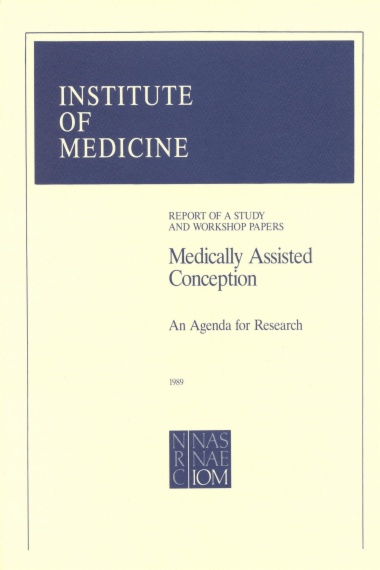This book results from a study by a committee of the Institute of Medicine and the National Research Council's Board on Agriculture. The committee examined the scientific foundations of medically assisted conception and developed an agenda for basic research in reproductive and developmental biology that would contribute to advances in the clinical and agricultural practice of in vitro fertilization and embryo transfer. The volume also discusses some barriers to progress in research and ways of lowering them, and explains the scientific issues important to ethical decision making.
- Cover
- Front Matter
- Summary/Scope of the Study
- I. In Vitro Fertilization and Embryo Transfer and Social Concerns
- II. Advances in the Practive and Science Base of Medically Assisted Conception
- III. Barriers to Progress in In Vitro Fertilization and Embryo Transfer
- IV. Research Agenda and Recommendations
- Appendix A: Papers Presented at Workshop
- Technologies for Assisted Conception/Embryo Transfer in Agricultural and Veterinary Practice
- Ovarian Stimulation in Non-Human Primates
- Responses to Gonadotropins in Domestic Animals
- Membrane Models: Evolution From the Fluid-Mosaic Standby
- Mammalian Oocyte Maturation: Mechanisms for Regulation and Prospects for Practical Application of In Vitro Technology
- Intragonadal Control of Testis Function
- Paracrine Regulation in the Ovary
- Experimental Approaches to the Study of Early Developmental Failure in Human Reproduction
- The Fertilizing Sperm: Structure, Maturation and Function
- Molecular Events Pre- and Post-Fertilization of Mouse Eggs: Oocyte Maturation, Egg Activation, and Polyspermy Block
- Glycolytic Pathway in Preimplantation Mammalian Embryos
- Regulative Potential of Micromanipulated Embryos
- Uterine Receptivity, Maternal Recognition of Pregnancy and Early Embryonic Loss
- Towards a Cellular and Molecular Understanding of Implantation in the Human: Implications for Assisted Reproductive Technologies

